被动语态讲解讲解很详细
被动语态的讲解
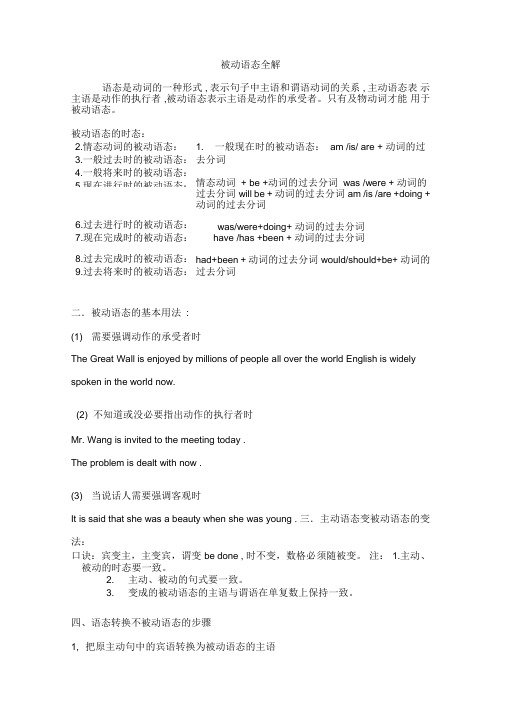
2.情态动词的被动语态:3.一般过去时的被动语态:4.一般将来时的被动语态:5.现在进行时的被动语态:6.过去进行时的被动语态:7.现在完成时的被动语态:8.过去完成时的被动语态:9.过去将来时的被动语态:被动语态全解语态是动词的一种形式, 表示句子中主语和谓语动词的关系, 主动语态表示主语是动作的执行者,被动语态表示主语是动作的承受者。
只有及物动词才能用于被动语态。
被动语态的时态:1. 一般现在时的被动语态:am /is/ are + 动词的过去分词情态动词+ be +动词的过去分词was /were + 动词的过去分词will be + 动词的过去分词am /is /are +doing +动词的过去分词was/were+doing+ 动词的过去分词have /has +been + 动词的过去分词had+been + 动词的过去分词would/should+be+ 动词的过去分词二.被动语态的基本用法:(1) 需要强调动作的承受者时The Great Wall is enjoyed by millions of people all over the world English is widely spoken in the world now.(2) 不知道或没必要指出动作的执行者时Mr. Wang is invited to the meeting today .The problem is dealt with now .(3) 当说话人需要强调客观时It is said that she was a beauty when she was young . 三.主动语态变被动语态的变法:口诀:宾变主,主变宾,谓变be done , 时不变,数格必须随被变。
注:1.主动、被动的时态要一致。
2. 主动、被动的句式要一致。
3. 变成的被动语态的主语与谓语在单复数上保持一致。
四、语态转换不被动语态的步骤1, 把原主动句中的宾语转换为被动语态的主语2, 把动词改为被动语态形式即"be+ 过去分词"。
被动语态讲解(讲解很详细,练习很到位)ppt课件
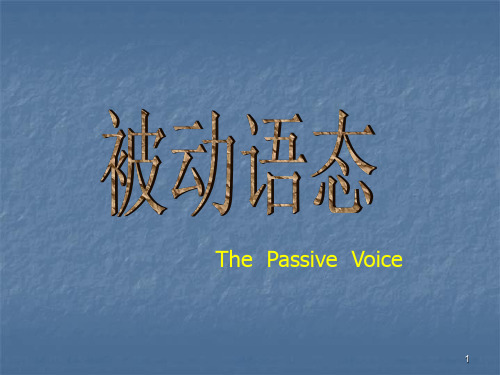
3
改为被动语态
His brother washes bowls every day.
主
谓 宾(受动者)
Bowls are washed by his brother every day.
4
They play football on Sunday.
Football is played by them on Sunday.
Lucy does the homework in the evening.
The homework is done by Lucy in the evening.
e.g. They make us do all the work.
The whole country was very sad at the news of his death;
People had considered him to be a great leader.
He had been considered to be a great leader.
22
10: 动词不定式的被动语态 1. be to do---- be to be done 2. be going to do---be going to be done 3. Be about to do---be about to be done Eg: He is to read a novel
23
被动语态中的特殊情况
1.不及物动词带介词和介词宾语时,在变为被动语 态时,仍然要带上介词。
被动语态知识点讲解(更全面,思路清晰)
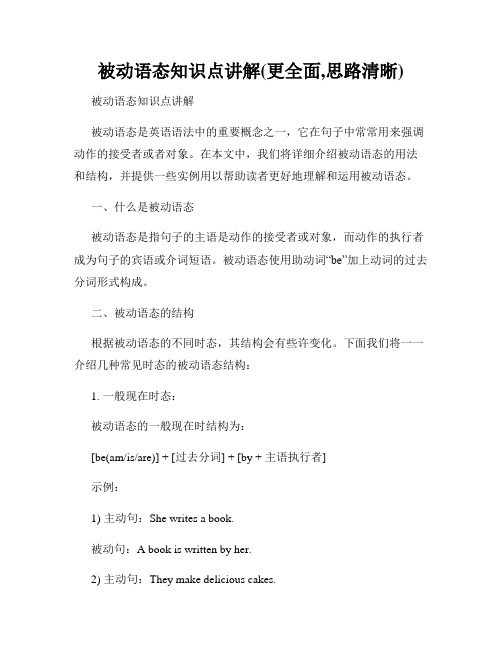
被动语态知识点讲解(更全面,思路清晰)被动语态知识点讲解被动语态是英语语法中的重要概念之一,它在句子中常常用来强调动作的接受者或者对象。
在本文中,我们将详细介绍被动语态的用法和结构,并提供一些实例用以帮助读者更好地理解和运用被动语态。
一、什么是被动语态被动语态是指句子的主语是动作的接受者或对象,而动作的执行者成为句子的宾语或介词短语。
被动语态使用助动词“be”加上动词的过去分词形式构成。
二、被动语态的结构根据被动语态的不同时态,其结构会有些许变化。
下面我们将一一介绍几种常见时态的被动语态结构:1. 一般现在时态:被动语态的一般现在时结构为:[be(am/is/are)] + [过去分词] + [by + 主语执行者]示例:1) 主动句:She writes a book.被动句:A book is written by her.2) 主动句:They make delicious cakes.被动句:Delicious cakes are made by them.2. 现在进行时态:被动语态的现在进行时结构为:[be(am/is/are)] + [being] + [过去分词] + [by + 主语执行者]示例:1) 主动句:He is washing the car.被动句:The car is being washed by him.2) 主动句:They are building a house.被动句:A house is being built by them.3. 一般过去时态:被动语态的一般过去时结构为:[be(was/were)] + [过去分词] + [by + 主语执行者]示例:1) 主动句:She bought a new car.被动句:A new car was bought by her.2) 主动句:They painted the wall.被动句:The wall was painted by them.4. 过去进行时态:被动语态的过去进行时结构为:[be(was/were)] + [being] + [过去分词] + [by + 主语执行者]示例:1) 主动句:He was cleaning the house.被动句:The house was being cleaned by him.2) 主动句:They were repairing the car.被动句:The car was being repaired by them.三、被动语态的用法被动语态的使用可以有多种情况,下面是几个常见的用法:1. 强调行为的接受者:被动语态可以强调动作的接受者或者对象,使其在句子中得到突出。
被动语态完全讲解
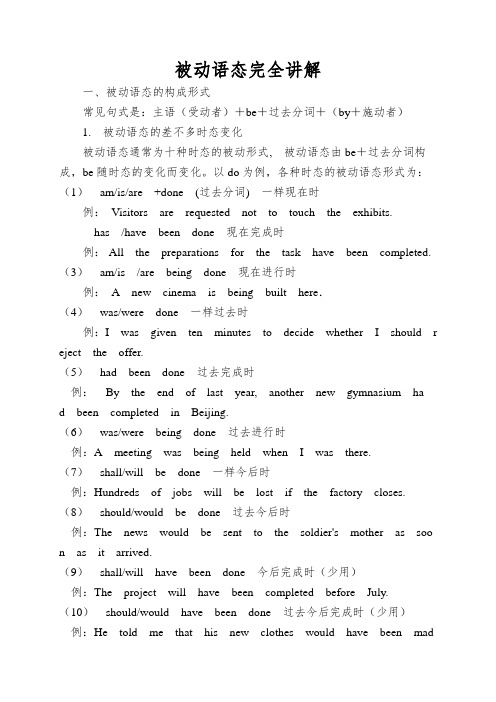
被动语态完全讲解一、被动语态的构成形式常见句式是:主语(受动者)+be+过去分词+(by+施动者)1.被动语态的差不多时态变化被动语态通常为十种时态的被动形式,被动语态由be+过去分词构成,be随时态的变化而变化。
以do为例,各种时态的被动语态形式为:(1)am/is/are+done(过去分词)一样现在时例:Visitors are requested not to touch the exhibits.has/have been done现在完成时例:All the preparations for the task have been completed. (3)am/is/are being done现在进行时例:A new cinema is being built here.(4)was/were done一样过去时例:I was given ten minutes to decide whether I should r eject the offer.(5)had been done过去完成时例:By the end of last year,another new gymnasium had been completed in Beijing.(6)was/were being done过去进行时例:A meeting was being held when I was there.(7)shall/will be done一样今后时例:Hundreds of jobs will be lost if the factory closes. (8)should/would be done过去今后时例:The news would be sent to the soldier's mother as soo n as it arrived.(9)shall/will have been done今后完成时(少用)例:The project will have been completed before July.(10)should/would have been done过去今后完成时(少用)例:He told me that his new clothes would have been made very soon.2.被动语态的专门结构形式(1)带情态动词的被动结构。
被动语态知识点讲解

被动语态知识点讲解一.基本结构1.一般现在时的被动语态结构:is/am/are+过去分词E.g.①The boy is looked after by his father. 这个小孩由他父亲照顾。
2.一般过去时的被动语态结构:was/were+过去分词E.g.①The cup was broken by Tom. 这个杯子是被汤姆打破的。
3.一般将来时的被动语态结构:will+be+过去分词E.g.①They will be allowed to go to school. 他们将会被允许去上学。
4.现在完成时的被动语态结构:has/have+been+过去分词E.g.①The battery hasn’t been charged for a couple of months. 电池好几个月没有充电了5.情态动词的被动语态结构:情态动词+be+过去分词E.g.①Today information can be received online. 现在,信息可以从网上接收到。
二.标志词1.一般现在时:usually,always,sometimes,often,every短语,never等。
2.一般过去时:ago, yesterday, the day before yesterday, last 短语, in +年, just now, at the age of , one day, once upona time, then, on that day等。
3.一般将来时:tomorrow,the day after tomorrow ,next短语in the future 等。
4.现在完成时:already,yet,just,before,since,for,ever,never,so far等。
5.情态动词:can, may, must, could, might, shall , should, will, would, need等。
(完整)初中英语被动语态讲解
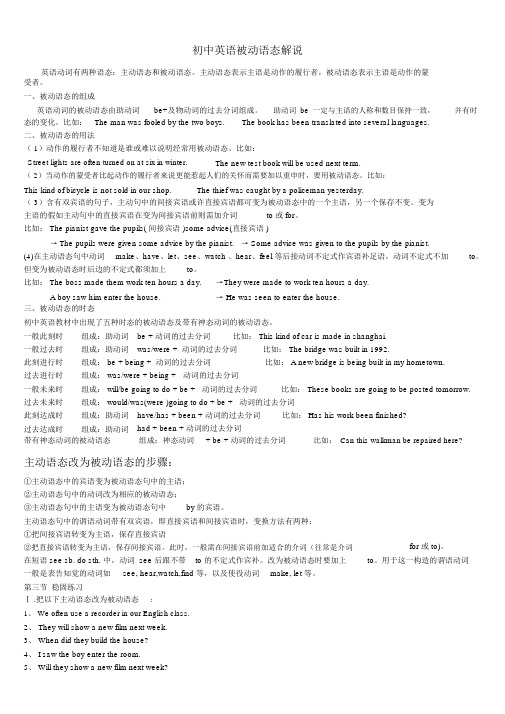
初中英语被动语态解说英语动词有两种语态:主动语态和被动语态。
主动语态表示主语是动作的履行者,被动语态表示主语是动作的蒙受者。
一、被动语态的组成英语动词的被动语态由助动词be+及物动词的过去分词组成。
助动词be一定与主语的人称和数目保持一致,态的变化。
比如:The man was fooled by the two boys.The book has been translated into several languages.二、被动语态的用法( 1)动作的履行者不知道是谁或难以说明经常用被动语态。
比如:并有时Street lights are often turned on at six in winter.The new test book will be used next term.( 2)当动作的蒙受者比起动作的履行者来说更能惹起人们的关怀而需要加以重申时,要用被动语态。
比如:This kind of bicycle is not sold in our shop.The thief was caught by a policeman yesterday.( 3)含有双宾语的句子,主动句中的间接宾语或许直接宾语都可变为被动语态中的一个主语,另一个保存不变。
变为主语的假如主动句中的直接宾语在变为间接宾语前则需加介词to 或 for。
比如: The pianist gave the pupils( 间接宾语 )some advice(直接宾语 )→The pupils were given some advice by the pianist. → Some advice was given to the pupils by the pianist.(4)在主动语态句中动词make、have、let、see、watch 、hear、feel 等后接动词不定式作宾语补足语,动词不定式不加to。
(完整)被动语态讲解
被动语态讲解一、总述:英语动词有两种语态,即主动语态(The Active Voice)和被动语态(The Passive Voice)。
主动语态表示主语是动作的执行者。
被动语态表示主语是动作的承受者。
They will build a new bridge over the river. (主动)A new bridge will be built over the river. (被动)汉语中常用“被”、“给”、“由”、“受”等词用来表示被动,而英语用:助动词be + 及物动词的过去分词构成。
二、被动语态的形式1) 常用时态的被动语态的构成:被动语态的基本形式为助动词be + 及物动词的过去分词,即be done。
被动语态的时态、人称和数的变化主要体现在be的变化上,其形式与系动词be的变化形式完全一样.以give 为例,列表如下:一般现在时:am / is / are + given一般过去时:was / were +given一般将来时:shall / will +be+ given过去进行时:was / were + being + given现在进行时:am / is / are + being + given过去完成时:had + been + given现在完成时:have / has + been + given将来完成时:shall / will + have been + given过去将来时: should / would +be+ given现在完成进行时:have/has been being done含情态动词的被动语态:情态动词+be done[注]被动语态没有将来进行时和过去将来进行时.2)被动语态的否定式:在第一个助动词后加not构成.Russian is not taught in our school. 我们学校不教俄语。
3)被动语态的疑问式:把第一个助动词提到主语之前,句尾加问号构成。
(完整版)英语被动语态语法讲解
初中被动语态语法讲解(一)语态分类英语动词有两种语态.,主动语态和被动语态。
主动语态表示主语是动作的执行者,被动语态表示主语是动作的承受者。
如: They will build a new bridge over the river. (主动)A new bridge will be built over the river. (被动) 汉语中常用“被”、“给”、“由”、“受”等词用来表示被动,而英语用:助动词be + 及物动词的过去分词构成。
(二)被动语态的时态、人称和数的变化主要体现在be的变化上,其形式与系动词be的变化形式完全一样。
以give 为例,列表如下:一般现在时:am / is / are + done 一般过去时:was / were + done一般将来时:shall / will + be done 一般过去将来时:should / would + be done现在进行时:am / is / are + being + done 过去进行时:was / were + being + done现在完成时:have / has + been + done 过去完成时:had + been + done将来完成时:shall / will + have been + done 过去将来完成时:should / would + have been + done [注]被动语态没有将来进行时和过去将来进行时。
(三)常见的八种时态中的被动语态1. 一般现在时:(1)People grow rice in the south of the country. Rice is grown in the south of the country.(2)The school doesn't allow us to enter lab without a teacher. We are not allowed to enter lab without a teacher.2. 一般过去时:(1)They agreed on building a new car factory last month. a new car building factory was agreed on last month.(2)The students didn't forget his lessons easily. His lessons w ere not easily forgotten3. 一般将来时:(1)They will send cars abroad by sea. Cars will be sent abroad by sea.(2)They will give plenty of jobs to school-leavers. Plenty of jobs will be given to school-leavers.5. 现在进行时:(1)The radio is broadcasting English lessons. English lessons a re being broadcasted on the radio.(2) We are painting the rooms. The rooms are being painted.6. 过去进行时:(1)The workers were mending the road. The road was being mended.(2)This time last year we were planting trees here. Trees were being planted here this time last year.7. 现在完成时:(1)Someone has told me the meeting might be put off.I have been told the meeting might be put off.(2)He has brought his book here. His book has been brought here.(四)含有情态动词的被动语态:含有情态动词的被动语态是由“情态动词+ be+及物动词的过去分词”构成。
被动语态理解被动语态的结构和用法
被动语态理解被动语态的结构和用法被动语态是英语语法中的重要概念,用于描述句子中的动作或状态受到其他主体的影响。
相较于主动语态,被动语态更加常用于强调受动者或者不确定或不重要的动作主体。
本文将介绍被动语态的结构和用法,帮助读者更好地理解和运用被动语态。
一、被动语态的结构被动语态的结构主要由be动词和过去分词构成,其中的be动词用来表示时态,过去分词则表示动作或状态的完成。
根据不同的时态,被动语态的结构可以有所变化。
下面以不同时态举例说明:1. 现在时态:am/is/are + 过去分词例如:- 主动语态:They clean the house every week.- 被动语态:The house is cleaned every week.2. 过去时态:was/were + 过去分词例如:- 主动语态:She cooked dinner yesterday.- 被动语态:Dinner was cooked yesterday.3. 将来时态:will be + 过去分词例如:- 主动语态:They will finish the project tomorrow.- 被动语态:The project will be finished tomorrow.4. 现在完成时态:has/have been + 过去分词例如:- 主动语态:He has written three books.- 被动语态:Three books have been written.需要注意的是,如果原主语是人称代词(如I, you, he, she, it, we, they),那么被动语态的结构中可以省略be动词中的is/am/are/was/were部分,并将过去分词放在人称代词之后。
二、被动语态的用法被动语态在英语中的使用相对频繁,可以用于多种情况下。
1. 强调受动者:被动语态常常用来强调受动者,即动作或状态的承受者。
_初中英语【被动语态】用法及易错点详细讲解
初中英语【被动语态】用法及易错点详细讲解所谓“被动语态”,相当于中文中常说的“被……”、“由……”的句式,如:“他的自行车被偷了”、“这座楼房是由他们建造的。
”一、主动语态和被动语态的概念1)He opened the door. 他开了门。
以上例句是一个主动句,主语是动作的执行者/发出者2)The door was opened by him. 门被开了。
第二个例句是一个被动句,主语是动作的承受者汉语中表示被动的词:被…/ 由…/ 受…/ 给…英语中表被动用:be+过去分词构成二、被动语态的结构及用法1)被动语态的几种句型肯定句:主语+be+及物动词的过去分词+(by)eg: My phone was made in China.否定句:主语+be not+过去分词+(by)eg: My phone wasn’t made in China.一般疑问句:Be+主语+过去分词+(by)?eg: Was your phone made in China?特殊疑问句:特殊疑问词+be+主语+过去分词+(by)?第 1 / 26 页eg: Where was your phone made?2)不同时态中的被动语态3)被动语态的用法当不知道或没有必要指出动作的执行者时,常用被动语态,这时往往不用by 短语。
The front window in the classroom was broken yesterday.昨天,教室的前窗被打破了。
(不知谁打破的)They have been poorly paid.他们的工资太低。
(没必要指出工资是谁付的)突出或强调动作的承受者,如果需要说出动作的执行者,用by短语。
These books are written especially for children.这些书是专门为孩子们写的。
(强调的是“这些书”)三、主动语态变被动语态1)一般情况下主动语态变被动语态主动句:He closed the door.第 2 / 26 页变被动句:The door was closed by him.口诀:宾变主,主变宾,谓变be done, 时不变,数格必须随被变。
- 1、下载文档前请自行甄别文档内容的完整性,平台不提供额外的编辑、内容补充、找答案等附加服务。
- 2、"仅部分预览"的文档,不可在线预览部分如存在完整性等问题,可反馈申请退款(可完整预览的文档不适用该条件!)。
- 3、如文档侵犯您的权益,请联系客服反馈,我们会尽快为您处理(人工客服工作时间:9:00-18:30)。
4.They should learn English well.
English should be learned well by them.
The TV set will be mended by Uncle Wang tomorrow.
4.Amy can take good care of Gina .
Gina can be taken good care of by Amy. 4情态动词: S+ can/may/must/should + be+ 过去分词
English is spoken as the first language in UK.
你知道这些被动句的否定句和一般疑问句吗?
2. They bought ten computers last term.
Ten computers were bought (by them) last term. 2一般过去时:S+was/were + 过去分词
? They used this room for resting.
This room was used for resting by them.
? They planted many trees years ago.
Many trees were planted by them years ago.
? The farmers will grow different kinds of vegetables next spring.
Different kinds of vegetables will be grown by the farmers next spring.
? Uncle Wang will mend the TV set tomorrow.
1.He can take care of the baby.
The baby can be taken care of by him.
2.Lucy may draw the pictures.
The picture may be drawn by Lucy.
3.You must turn off the lights.
Some photos will be taken by children in the schoolyard tomorrow.
? The headmaster will give a talk this afternoon.
A talk will be given by the headmaster this afternoon.
? They often use computers in class.
Computers are often used by them in class.
? We make these machines in Beilun.
These machines are made in Beilun.
? People speak English as the first language in UK.
Shoes are made factory.
一般现在时:
(by them) in that
S(主语)+am/is /are + 过去分词
改为被动语态
His brother washes bowls every
主
谓 宾(受动者)
day .
Bowls are washed by his brother every day.
The Passive Voice
被动语态基本用法
当句子的主语是动作的执行者时, 谓语的形式是 主动语态 。当句子的 主语是动作的 承受者时,谓语要用 被动语态。被动语态由助动词 be+ 过去分词oes in that factory. 主语+及物动词+宾语
? They play football on Sunday.
Football is played by them on Sunday.
? Lucy does the homework in the evening.
The homework is done by Lucy in the evening.
? He took good care of his little brother yesterday.
His little brother was taken good care of by him yesterday.
? We cleaned our classroom just now.
Our classroom was cleaned by us just now.
He looked after the little baby yesterday.
主
谓
宾(受动者 )
The little baby was looked after by him
yesterday .
? They built the tall building last year.
The tall building was built by them last year.
3.They will finish the work in ten days.
The work will be finished (by them) in ten days. 3一般将来时: S+ will+be+过去分词
Tom will clean the room tomorrow .
主
谓
宾(受动者 )
The room will be cleaned by Tom tomorrow.
? We will have a sports meeting next week.
A sports meeting will be had by us next week.
? Children will take some photos in the schoolyard tomorrow.
